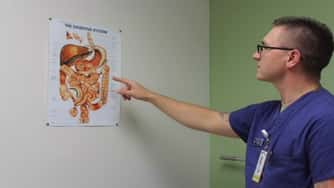What You'll Treat As a Gastroenterologist
The symptoms and ailments you need to know as a gastroenterologist

Foodies all over the globe agree that taste is one of our most enjoyable sensations. But along with taste comes digestion, and without proper digestion, we can’t enjoy our food.
A gastroenterologist, or GI, diagnoses and treats diseases related to digestion. This includes anything along the digestive tract, such as the stomach, appendix, intestines, and colon. In general, GIs step in when things go awry in response to the consumption of any liquid or solid.
Because digestion is essential to our ability to get the nutrients we need to live, gastroenterologists play a vital role in many people’s lives. Let’s take a brief look at how to become a GI before we delve into the types of health issues they treat.
How to Become a Gastroenterologist
Preparation for diagnosing and treating the digestive tract takes roughly 13 years. The journey starts with getting a bachelor's degree in science from a four-year college. From there, an additional four years in medical school is required, as well as a 3-year residency to learn about internal medicine.
Afterward, medical students are ready to narrow their focus to just gastroenterology. During this 2-3 year period, budding physicians will get hands-on experience at a clinic or hospital under the supervision of a trained gastroenterologist.
Then students will be ready to earn their gastroenterology certification from the American Board of Colon and Rectal Surgery. Those that succeed can start practicing medicine on their own.
Types of Diseases and Digestive Issues
Gastroenterologists must diagnose and treat a wide range of possible digestion issues and conditions. The following list is comprised of some of the more common occurrences.
- Diverticular disease: multiple pouches form in colon and become inflamed, or bleed
- Anorectal disorders: issues involving the rectum, such as hemorrhoids, cancer, polyps, or painful tears
- Gastroesophageal reflux disease, or acid reflux: items in stomach come back up due to the esophageal sphincter not closing properly
- Hiatal hernia: organs move through the diaphragm to areas they should not be in leading to chest pain, bowel obstruction, heartburn and more
- Inflammatory bowel disease, or IBD: covers inflammatory issues below the stomach, such as Crohn’s disease and ulcerative colitis
- Irritable bowel syndrome, or IBS: primarily deals with irregular bowel movement symptoms without any known cause
- Hepatic disease: liver issues ranging from inflammation problems from hepatitis to cirrhosis or the chronic scarring of internal wall tissue
- Ulcers: breaks or tears in the digestive tract that prevent said organ from conducting its purpose
These are just a few of the topics you will learn about on the way to becoming a gastroenterologist. Many of these diseases share the following symptoms:
- Constipation
- Diarrhea
- Heartburn
- Abdominal pain
- Indigestion
- Nausea
- Vomiting
- Unexplained weight loss
Recognizing those common symptoms and diagnosing the corresponding illness is difficult and one of the reasons for the high education requirement.
Gastroenterologists can further sharpen their practice by choosing a field to specialize in. For example, GIs may opt to focus their attention on treating ulcers or hepatic diseases. Specialization may lead to higher salary in the long run.

